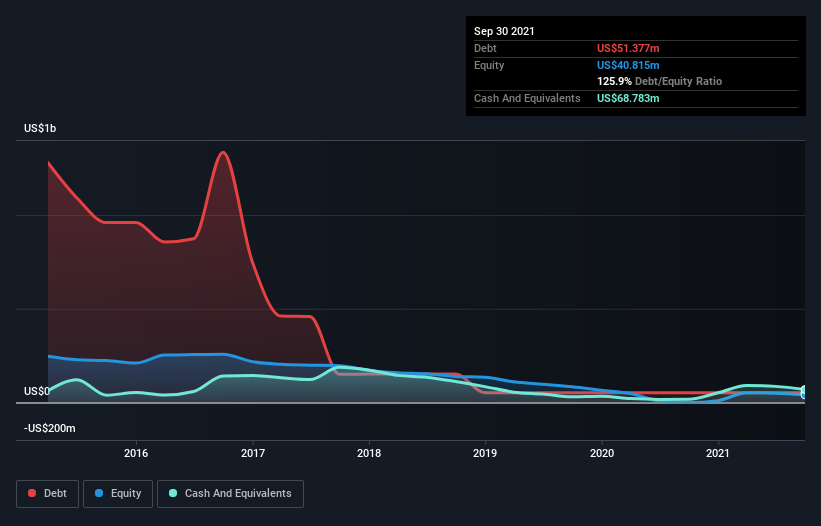Some say volatility, rather than debt, is the best way to think about risk as an investor, but Warren Buffett famously said that 'Volatility is far from synonymous with risk.' It's only natural to consider a company's balance sheet when you examine how risky it is, since debt is often involved when a business collapses. Importantly, Drive Shack Inc. (NYSE:DS) does carry debt. But is this debt a concern to shareholders?
What Risk Does Debt Bring?
Debt and other liabilities become risky for a business when it cannot easily fulfill those obligations, either with free cash flow or by raising capital at an attractive price. If things get really bad, the lenders can take control of the business. However, a more usual (but still expensive) situation is where a company must dilute shareholders at a cheap share price simply to get debt under control. Having said that, the most common situation is where a company manages its debt reasonably well - and to its own advantage. When we examine debt levels, we first consider both cash and debt levels, together.
See our latest analysis for Drive Shack
What Is Drive Shack's Debt?
The chart below, which you can click on for greater detail, shows that Drive Shack had US$51.4m in debt in September 2021; about the same as the year before. However, its balance sheet shows it holds US$68.8m in cash, so it actually has US$17.4m net cash.

How Strong Is Drive Shack's Balance Sheet?
The latest balance sheet data shows that Drive Shack had liabilities of US$91.3m due within a year, and liabilities of US$352.4m falling due after that. Offsetting these obligations, it had cash of US$68.8m as well as receivables valued at US$25.1m due within 12 months. So its liabilities outweigh the sum of its cash and (near-term) receivables by US$349.8m.
This deficit casts a shadow over the US$111.4m company, like a colossus towering over mere mortals. So we'd watch its balance sheet closely, without a doubt. At the end of the day, Drive Shack would probably need a major re-capitalization if its creditors were to demand repayment. Drive Shack boasts net cash, so it's fair to say it does not have a heavy debt load, even if it does have very significant liabilities, in total. There's no doubt that we learn most about debt from the balance sheet. But ultimately the future profitability of the business will decide if Drive Shack can strengthen its balance sheet over time. So if you're focused on the future you can check out this free report showing analyst profit forecasts.
Over 12 months, Drive Shack reported revenue of US$272m, which is a gain of 17%, although it did not report any earnings before interest and tax. We usually like to see faster growth from unprofitable companies, but each to their own.
So How Risky Is Drive Shack?
By their very nature companies that are losing money are more risky than those with a long history of profitability. And in the last year Drive Shack had an earnings before interest and tax (EBIT) loss, truth be told. And over the same period it saw negative free cash outflow of US$30m and booked a US$17m accounting loss. With only US$17.4m on the balance sheet, it would appear that its going to need to raise capital again soon. Summing up, we're a little skeptical of this one, as it seems fairly risky in the absence of free cashflow. The balance sheet is clearly the area to focus on when you are analysing debt. However, not all investment risk resides within the balance sheet - far from it. Case in point: We've spotted 4 warning signs for Drive Shack you should be aware of, and 2 of them are a bit unpleasant.
If, after all that, you're more interested in a fast growing company with a rock-solid balance sheet, then check out our list of net cash growth stocks without delay.
New: Manage All Your Stock Portfolios in One Place
We've created the ultimate portfolio companion for stock investors, and it's free.
• Connect an unlimited number of Portfolios and see your total in one currency
• Be alerted to new Warning Signs or Risks via email or mobile
• Track the Fair Value of your stocks
Have feedback on this article? Concerned about the content? Get in touch with us directly. Alternatively, email editorial-team (at) simplywallst.com.
This article by Simply Wall St is general in nature. We provide commentary based on historical data and analyst forecasts only using an unbiased methodology and our articles are not intended to be financial advice. It does not constitute a recommendation to buy or sell any stock, and does not take account of your objectives, or your financial situation. We aim to bring you long-term focused analysis driven by fundamental data. Note that our analysis may not factor in the latest price-sensitive company announcements or qualitative material. Simply Wall St has no position in any stocks mentioned.
About OTCPK:DSHK
Drive Shack
Owns and operates golf-related leisure and entertainment venues and courses in the United States.
Low risk and slightly overvalued.
Similar Companies
Market Insights
Community Narratives



